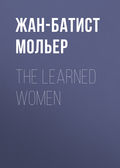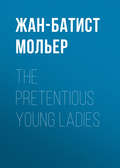
Мольер (Жан-Батист Поклен)
Monsieur De Pourceaugnac
SCENE XII. – MR. DE POURCEAUGNAC (alone)
What the devil is all this? Are the people of this place crazy? I never saw anything like it; and I don't understand it a bit.
SCENE XIII. – MR. DE POURCEAUGNAC, TWO PHYSICIANS (in grotesque clothes)
(They all three at first sit down; the Physicians rise up at different times to bow to Mr. de Pourceaugnac, who rises up as often to bow to them in return.)
THE TWO PHYSICIANS
Buon dì, buon dì, buon dì!
Non vi lasciate uccidere
Dal dolor malinconico.
Noi vi faremo ridere
Col nostro canto armonico;
Sol per guarirvi.
Siamo venuti quì.
Buon dì, buon dì, buon dì!
1ST PHYSICIAN
Altro non è la pazzia
Che malinconia.
Il malato
Non è disperato
Se vol pigliar un poco d'allegria,
Altro non è la pazzia
Che malinconia.
2ND PHYSICIAN
Sù; cantate, ballate, ridete.
E, se far meglio volete,
Quando sentite il deliro vicino
Pigliate del vino,
E qualche volta un poco di tabàc.
Allegramente, Monsu Pourceaugnàc. 9
SCENE XIV. – BALLET
SCENE XV. – MR. DE POURCEAUGNAC, AN APOTHECARY
Apo. Sir, here is a little remedy; a little remedy which you must take, if you please; if you please.
Mr. Pour. How? I have no occasion for anything of the kind.
Apo. It was ordered, Sir; it was ordered.
Mr. Pour. Ah! What noise and bother.
Apo. Take it, Sir; take it, Sir. It will do you no harm; it will do you no harm, &c.
(Mr. de Pourceaugnac runs away, the Apothecary &c. after him.)
SCENE XVI. – MR. DE POURCEAUGNAC, AN APOTHECARY, TWO PHYSICIANS (in grotesque clothes)
The Two Physicians
Piglialo sù,
Signor Monsu;
Piglialo, piglialo, piglialo sù,
Che non ti fara, male, &c.10
ACT II
SCENE I. – 1ST PHYSICIAN, SBRIGANI
1st Phy. He has forced through every obstacle I had placed to hinder him, and has fled from the remedies I was beginning to prepare for him.
Sbri. To avoid remedies so salutary as yours is to be a great enemy to oneself.
1st Phy. It is the mark of a disturbed brain and of a depraved reason to be unwilling to be cured.
Sbri. You would have cured him, for certain, in no time.
1st Phy. Certainly; though there had been the complication of a dozen diseases.
Sbri. With all that he makes you lose those fifty well-earned pistoles.
1st Phy. I have no intention of losing them; and I am determined to cure him in spite of himself. He is bound and engaged to take my remedies; and I will have him seized, wherever I can find him, as a deserter from physic and an infringer of my prescriptions.
Sbri. You are right. Your medicines were sure of their effect; and it is so much money he takes from you.
1st Phy. Where could I find him?
Sbri. No doubt, at the house of that goodman Oronte, whose daughter he comes to marry; and who, knowing nothing of the infirmity of his future son-in-law, will perhaps be in a hurry to conclude the marriage.
1st Phy. I will go and speak to him at once.
Sbri. You should, in justice to yourself.
1st Phy. He is in need of my consultations; and a patient must not make a fool of his doctor.
Sbri. That is well said; and, if I were you, I would not suffer him to marry till you have physicked him to your heart's content.
1st Phy. Leave that to me.
Sbri. (aside, and going). For my part, I will bring another battery into play; for the father-in-law is as much of a dupe as the son-in-law.
SCENE II. – ORONTE, 1ST PHYSICIAN
1st Phy. A certain gentleman, Sir, a Mr. de Pourceaugnac, is to marry your daughter; is he not?
Oro. Yes; I expect him from Limoges, and he ought to have been here before now.
1st Phy. And he has come; he has run away from my house, after having been placed under my care; but I forbid you, in the name of the faculty, to proceed with the marriage you have decided upon, before I have duly prepared him for it, and put him in a state to have children well-conditioned both in mind and body.
Oro. What is it you mean?
1st Phy. Your intended son-in-law was entered as my patient. His disease which was given me to cure is a chattel which belongs to me, and which I reckon among my possessions. I therefore declare to you that I will not allow him to marry before he has rendered due satisfaction to the faculty, and submitted to the remedies which I have ordered for him.
Oro. He is suffering from some disease?
1st Phy. Yes.
Oro. And from what disease, if you please?
1st Phy. Don't trouble yourself about that.
Oro. Is it some disease…?
1st Phy. Doctors are bound to keep things secret. Let it suffice you that I enjoin both you and your daughter not to celebrate the wedding without my consent, upon pain of incurring the displeasure of the faculty, and of undergoing all the diseases which we choose to lay upon you.
Oro. If that is the case, I shall take good care to put a stop to the marriage.
1st Phy. He was entrusted to me, and he is bound to be my patient.
Oro. Very well.
1st Phy. It is in vain for him to run away; I will have him sentenced to be cured by me.
Oro. I am very willing.
1st Phy. Yes; he must either die or be cured by me.
Oro. I consent to it.
1st Phy. And if I cannot find him, I will make you answerable, and cure you instead of him.
Oro. I am in very good health.
1st Phy. No matter. I must have a patient, and I will take anyone I can.
Oro. Take whom you will, but it shall not be me. (Alone) Did you ever hear of such a thing!
SCENE III. – ORONTE, SBRIGANI as a Flemish merchant
Sbri. Sir, py your leafe, I pe one voreign marchant, and vould like ask you one littel news.
Oro. What, Sir?
Sbri. Put you de hat on de head, Sir, if you pleace.
Oro. Tell me. Sir, what you want.
Sbri. I tell nozink, Sir, if you not put de hat on de head.
Oro. Very well, then, what is it, Sir?
Sbri. You not know in dis town one Mister Oronte?
Oro. Yes, I know him.
Sbri. And vat for one man is he, Sir, if you pleace?
Oro. He is like any other man.
Sbri. I ask you, Sir, if he one man of money is?
Oro. Yes.
Sbri. But very mooch rich, Sir?
Oro. Yes.
Sbri. It does me mooch pleasure, Sir.
Oro. But why should it?
Sbri. It is, Sir, for one littel great reason for us.
Oro. But why?
Sbri. It is, Sir, dat dis Mr. Oronte his tauchter in marriage to a certain Mr. Pourgnac gifes.
Oro. Well!
Sbri. And dis Mr. Pourgnac, Sir, is one man vat owes mooch golt to ten or twelf Flemish marchants vat come here.
Oro. T his Mr. de Pourceaugnac owes a great deal to ten or twelve merchants?
Sbri. Yes, Sir; and for de last eight months ve hafe obtain one littel judgment against him, and he put off all de credeetors till dis marriage vat Mr. Oronte gifes to his tauchter.
Oro. Ho! ho! So he puts off paying his creditors till then?
Sbri. Yes, Sir; and vid great defotion ve all wait for dis marriage.
Oro. The idea is not bad. (Aloud) I wish you good day.
Sbri. I tank de gentleman for de favour great.
Oro. Your very humble servant.
Sbri. I pe, Sir, more great obliged don all py de goot news vat the Mister gife me. (Alone, after having taken off his beard, and taken off the Flemish dress which he has put over his) Things don't go badly. All is going on swimmingly. I must throw off this disguise and think of something else. We will put so much suspicion between the father-in-law and his son-in-law that the intended marriage must come to nothing. They are both equally fit to swallow the baits that are laid for them, and it is mere child's play for us great sharpers when we find such easy gulls.
SCENE IV. – MR. DE POURCEAUGNAC, SBRIGANI
Mr. Pour. (thinking himself alone). Piglialo sù, piglialo sù, Signor Monsu. What the deuce does it all mean? (Seeing Sbrigani) Ah!
Sbri. What is the matter, Sir? what ails you?
Mr. Pour. Everything I see seems injection.
Sbri. How is that?
Mr. Pour. You can't think what has happened to me in that house where you took me.
Sbri. No! What has happened?
Mr. Pour. I thought I should be well feasted there.
Sbri. Well?
Mr. Pour. I leave you in this gentleman's hands. Doctors dressed in black. In a chair. Feel the pulse. In proof of what I say. He is mad. Two big, fat-faced fellows, with large-brimmed hats. Buon dì, buon dì. Six pantaloons. Ta, ra, ta, toi, ta, ra, ta, ta, toi. Allegramente, Monsu Pourceaugnac. Take, Sir; take, take. It is gentle, gentle, gentle. Piglialo sù, Signor Monsu; piglialo, piglialo sù. I never was so surfeited with absurdities in all my life.
Sbri. What does it all mean?
Mr. Pour. It means, Sir, that this gentleman, with all his kissing and hugging, is a deceitful rascal, who has sent me to that house to play me some trick.
Sbri. Is it possible?
Mr. Pour. It is, indeed. They were a dozen devils at my heels, and I had all the difficulty in the world to escape out of their clutches.
Sbri. Just fancy how deceitful people's looks are; I should have taken him for the most affectionate friend you have. It is a wonder to me how there can exist such rascals in the world.
Mr. Pour. My imagination is full of it all; and it seems to me that I see everywhere a dozen injections threatening me.
Sbri. This is really too bad! how treacherous and wicked people are!
Mr. Pour. Pray, tell me where Mr. Oronte lives. I should be glad to go there at once.
Sbri. Ah! ah! you are of a loving disposition, I see; and you have heard that Mr. Oronte has a daughter?
Mr. Pour. Yes; I am come to marry her.
Sbri. To ma … to marry her?
Mr. Pour. Yes.
Sbri. In wedlock?
Mr. Pour. How could it be otherwise?
Sbri. Oh! it is another thing, and I beg your pardon.
Mr. Pour. What is it you mean?
Sbri. Oh, nothing.
Mr. Pour. But, pray!
Sbri. Nothing, I tell you. I spoke rather hastily.
Mr. Pour. I beg of you to tell me what it is.
Sbri. No; it is not necessary.
Mr. Pour. Pray do.
Sbri. No; I beg you to excuse me.
Mr. Pour. What! are you not one of my friends?
Sbri. Yes, certainly; nobody more so.
Mr. Pour. Then you ought not to hide anything from me.
Sbri. It is a thing in which a neighbour's honour is concerned.
Mr. Pour. That I may oblige you to treat me like a friend, here is a small ring I beg of you to keep for my sake.
Sbri. Let me consider a little if I can in conscience do it. (Goes away a small distance from Mr. de Pourceaugnac.) He is a man who looks after his own interests, who tries to provide for his daughter as advantageously as possible; and one should injure nobody. It is true that these things are no secret; but I shall be telling them to a man who knows nothing about it, and it is forbidden to talk scandal of one's neighbour. All this is true. On the other hand, however, here is a stranger they want to impose upon, who comes in all good faith to marry a girl he knows nothing about, and whom he has never seen. A gentleman all openheartedness, for whom I feel some inclination, who does me the honour of reckoning me his friend, puts his confidence in me, and gives me a ring to keep for his sake. (To Mr. de Pourceaugnac) Yes, I think that I can tell you how things are without wounding my conscience. But I must try to tell it all to you in the mildest way possible, and to spare people as much as I can. If I were to tell you that this girl leads a bad life, it would be going too far. I must find some milder term to explain myself. The word coquette does not come up to the mark; that of downright flirt seems to me to answer the purpose pretty well, and I can make use of it to tell you honestly what she is.
Mr. Pour. They want to make a fool of me then?
Sbri. But it may not be so bad as people think; and after all, there are men who set themselves above such things, and who do not think that their honour depends upon…
Mr. Pour. I am your servant; I have no wish to adorn my person with such a head-dress, and the Pourceaugnacs are accustomed to walk with their heads free.
Sbri. Here is the father.
Mr. Pour. Who? this old man?
Sbri. Yes. Allow me to withdraw.







